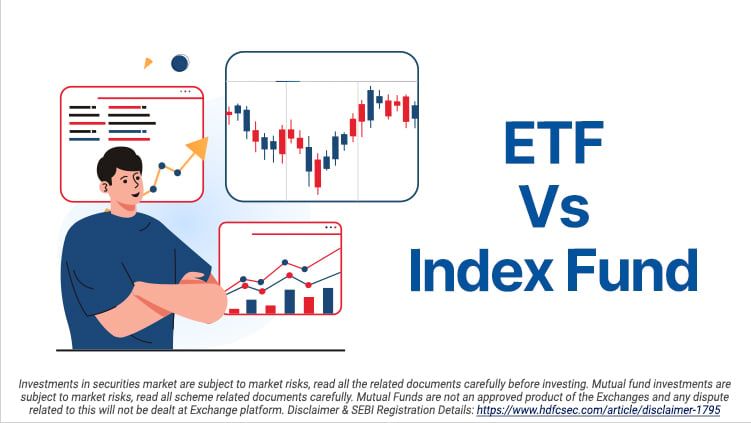ETF vs Index Fund
Exchange Traded Funds (ETFs) and Index Funds are two of the most popular passive investment options to explore. The article gives you a quick overview of the two investment options and also lays down a detailed ETF vs Index Fund comparison, helping you make informed investment decisions.
About ETF
An exchange-traded fund (ETF) is a type of pooled investment security that tracks a particular index, commodity, sector or other assets. ETFs operate like mutual funds, but they can also be purchased or sold on a stock exchange like a stock.
ETFs are listed on the stock exchange and can be structured to track the price of an individual commodity, index or specific investment strategies.
There are various types of ETFs you can invest in like Index ETFs, Gold ETFs, Commodity ETFs, International ETFs, and more. You can choose to invest in any type of ETF considering your goals and risk appetite.
About Index Funds
Index Fund is a type of mutual fund that tracks a particular market index for its returns and risk. It could be any market index – benchmark index, market capitalisation index, sectoral index, or broad market index. The fund’s investments will replicate the composition of the market index it tracks. It will earn similar returns and involve risk as the underlying index.
For instance, you choose the benchmark index BSE Sensex for investment. BSE Sensex includes the top 30 stocks listed on the BSE. Your index fund portfolio will have these 30 stocks in the same weightage as in the index. Your investment returns are tied to BSE Sensex’s performance.
Index Funds are a great passive investment option as they do not require you to constantly monitor the market. You just need to track one market index to determine your fund’s performance.
Difference between ETF and Index Fund
Refer to the following table to know the key differences between ETF and Index Funds:
|
Point of difference |
ETF |
Index Funds |
|
Demat Account requirement |
You need a Demat Account to invest in ETF. |
Having a Demat Account is not necessary for Index Funds. However, you can always choose to have one. |
|
SIP investment option |
You cannot opt for SIP to invest in ETF. |
You can invest in Index Funds through SIP. |
|
Fund valuation |
ETF valuation takes place continuously. |
Index Funds are valued at the end of every day. |
|
Fund management |
ETFs have flexible trading options. |
Index Funds are typically managed by a professional fund manager. |
|
Expense ratios |
ETFs have a lower expense ratio than Index Funds. |
Index Funds have a higher expense ratio. |
Both ETFs and index funds are low-cost investments that offer investors an opportunity to gain exposure to a diversified portfolio of securities. ETFs provide greater flexibility in trading and allow for more active management, while index funds offer lower expense ratios. Ultimately, the choice between ETFs and index funds depends on an individual’s investment goals, risk tolerance, and personal preferences. By understanding the difference between ETF and index fund, investors can make an informed decision and build a well-diversified portfolio that aligns with their financial objectives.
Related Posts
Don't miss another Article
Subscribe to our blog for free and get regular updates right into your inbox.
Categories
newsletter
 HSL Mobile App
HSL Mobile App 







